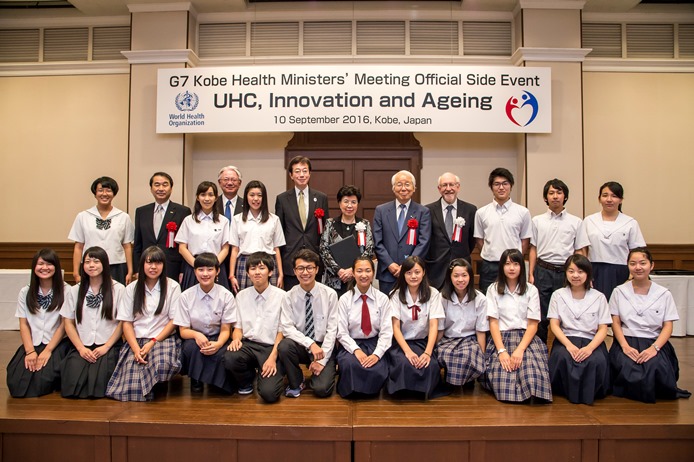2016
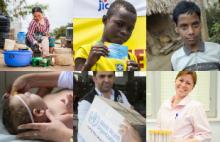
WHO's Year in Review for 2016
2016 has been a turbulent year, in which WHO has tackled disease outbreaks and humanitarian crises and championed efforts to combat antimicrobial resistance and move towards universal health coverage. It has helped countries eliminate infectious diseases and implement programmes to beat cancer, diabetes and other noncommunicable diseases.
It was also a special year for Japan and its leadership on global health, and for WKC. The G7 Ise-Shima Summit and Vision for Global Health; the G7 Health Ministers’ Meeting in Kobe; and the sixth TICAD meeting in Africa all provided momentum for UHC, for paying special attention to the needs of ageing populations, and for ensuring global health security. WKC launched its new 10 year strategy (2016-2026), major new research, and organized key WHO-MHLW side meetings to the G7 Health Ministers meeting and for the G7 Summit preparation.

Dr Halfdan T. Mahler, WHO’s third Director-General, dies at 93
WHO is saddened by the death of Dr Halfdan T. Mahler on 14 December 2016. Dr Mahler served as Director-General of WHO from 1973-1988.
As WHO's third Director-General, Dr Mahler will be remembered as a champion for primary care. He played a key leadership role shaping the 1978 Alma Ata Declaration that defined the Health for All by the Year 2000 strategy. Under his leadership, WHO and UNICEF jointly produced the report, Alternative Approaches to Meeting Basic Health Needs in Developing Countries, which examined successful primary health care in various countries.
After retiring from WHO in 1988, Dr Mahler directed the International Planned Parenthood Federation until 1995. Even after his retirement from WHO, Dr Mahler cheered the Organization’s progress as it expanded its work in primary care. He will be deeply missed by the global health community.

Act with Ambition: Universal Health Coverage (UHC) Day 2016
UHC means that all individuals and communities receive the health services they need without suffering financial hardship. On 12 December 2016, for the UHC Day, WHO and partners will demand political action from leaders to invest in policies and health systems that reach every person and community based on need, and not ability to pay.

World Antibiotic Awareness Week
This year, World Antibiotic Awareness Week will be held from 14 to 20 November 2016. The campaign aims to increase awareness of global antibiotic resistance and to encourage best practices among the general public, health workers, policy-makers and the agriculture sector to avoid the further emergence and spread of antibiotic resistance.
Related links
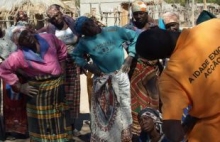
Research on community-based social innovations for healthy ageing: Call for Expression of Interest
The WHO Kobe Centre (WKC) has launched a research project on community-based social innovations for healthy ageing (CBSI).
Partnering with RAND Europe, this new research aims at improving health and well-being among older people at a community level, and to guide development and implementation of various models of community-based care and support services. These are needed as many countries and communities have not yet fully planned to deliver comprehensive health/social services in support of rapidly ageing populations.
See the Call for Expression of Interest (EOI) for interested organizations to propose CBSI case study sites. Deadline for EOI submission is 31 December 2016.
The study will investigate a) health/social delivery innovations implemented in a community that emphasize active engagement of older people, b) interventions that aim to assist older persons to increase autonomy and to maintain or enhance their health and quality-of-life for as long as possible, and c) examine their effectiveness and integration/coordination with the wide health care system.
WHO and RAND Europe will conduct a systematic review and case studies of up to ten middle-income countries across the world. Primary data collection in selected case studies will provide evidence about CBSIs, including how they operate, link to other health and social care services, and what benefits they bring for participants.
Anticipated research results include: creating a typology of CBSIs and policy options/briefs to inform country policy and planning to ensure greater sustainability and integration of services, in the context of universal health coverage.
“The WHO Kobe Centre’s leading research on innovations in community models of care and support for older populations is instrumental to help countries design and plan their programmes to attain universal health coverage, and to implement key actions called for in the 2016 G7 Health Ministers’ meeting communique,” said Alex Ross, Director of the WHO Kobe Centre. He further noted that “this research is being implemented with many WHO departments and offices across the world, and is grounded on the WHO World Report on Ageing and Health and WKC’s new ten-year strategy on UHC, innovation and ageing.”
WKC and RAND Europe are now inviting all interested parties to suggest case study sites on community-based social innovations (CBSIs) that support older people in middle-income countries (MICs).
Additional Information:
- Submission deadline for the Expression of Interest (EOI) is 31 December 2016. Selection of case studies will be done by January/February 2017.
- The entire project is scheduled to continue until November 2017.
- This project is based on initial WKC research on CBSIs in predominantly low- and middle-income countries (LMICs) in 2015.
Related Links:
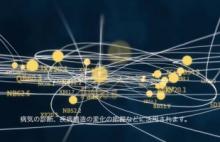
Developing the new International Classification of Diseases (ICD), 11th Edition
Japan hosted two major meetings in Tokyo on 12 to 15 October 2016: a) Tokyo conference on the 11th revision of the International Statistical Classification of Diseases and Related Health Problems, or ICD-11, and b) a meeting of the WHO Family of International Classifications (WHO-FIC) Network. At the ICD 11 Revision Conference, the Director, WHO Kobe Centre, presented on strategies to increase the integration of the International Classification of Functioning (ICF) with the ICD 11, as well as with other indicator sets, to help monitor the functioning and health status of older persons.
The WHO Director-General addressed the Conference noting its importance and that “this is an historical occasion and an historical opportunity to give the medical, epidemiological, and public health communities a cutting-edge statistical tool. Specific, precise, and comparable data are the foundation of everything we do”
The importance of the ICD11 and International Classifications
The ICD has existed for 100-years as a standard statistical instrument, that contains many standard definitions for diseases and codes. The ICD is instrumental to support countries, as the coding is used as the basis for national civil and vital statistics registration, and health information systems. The ICD 11 will be necessary for countries to be able to gather high-quality, specific, and comparable statistical data, and cause-specific mortality data (which are used by countries to track SDG targets and indicators). It is also needed for electronic health records; statistical purposes (it groups together medical terms reported by physicians, medical examiners, and coroners on death certificates); and serves as the international standard diagnostic classification for all general epidemiological and many health management purposes, including reimbursements by governments and insurers.
Until now, classifications and indicators for monitoring the functioning of older persons and persons with disabilities have been missing. The ICF has not been used extensively. Many countries are also concerned about not having the capacity to implement various standards and indicators, for which there are many.
The Director, WHO Kobe Centre, outlined a number of key issues and recommendations that can help align various indicators and standards, particularly focusing on functional status. The further development of the ICD 11 is led by WHOs Department of Information, Evidence and Research (IER). Within WHO, WKC is collaborating with the IER Department, the Blindness, Deafness Prevention, Disability and Rehabilitation Team in the Noncommunicable Diseases and Mental Health Cluster, and the Ageing and Life Course Department on ways to better define indicators for ageing populations, universal health coverage (UHC), age and dementia friendly initiatives, and related metrics.
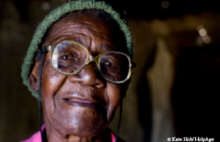
International Day of Older Persons - 1 October
The United Nations International Day of Older Persons is on October 1. In coordination with other UN partners, Member States, and NGOs, the World Health Organization will be raising awareness around population ageing, the opportunities it can bring, and the need for a global concerted effort to change policies to take advantage of increased longevity.
Challenge ageism
The theme of the International Day of Older Persons 2016 is “Take A Stand Against Ageism”. Ageism, the stereotyping and discrimination against older persons due to their age, is a serious social issue that limits opportunities and can even shorten lives. The Global strategy and action plan on ageing and health, adopted at the 69th World Health Assembly, calls on the WHO, in coordination with partners, to develop a global campaign to combat ageism.

Hyogo-Kobe GLOBAL HEALTH High School Summit Declaration
On 21 August 2016, the WHO Kobe Centre and the G7 Kobe Health Ministers' Meeting Promotion Council organized the first Hyogo-Kobe GLOBAL HEALTH High School Summit, with support from Japan’s Ministry of Health, Labour and Welfare.
At the Summit, about 400 participants discussed how high school students can contribute to global health through research presentations by six high schools, an expert panel discussion, and 54 poster presentations.
See the links of the video (right) of the entire event.
The Hyogo-Kobe Global Health High School declaration was developed and adopted by the high school students. And on 10 September 2016, the declaration was presented to the WHO Director General, Dr Margaret Chan, at a WHO-MHLW official side event to the G7 Health Ministers meeting that discussed “UHC, Innovation and Ageing: Research on innovations for achieving sustainable universal health coverage for ageing populations”.
Excerpt
"Today we, High School students in Kobe City and Hyogo Prefecture, have gathered to change the world. Globally, many health issues affect the health and welfare of all people, such as communicable diseases, inadequate nutrition, diarrheal diseases, maternal health, an aging society, and the need for self-care. To date, many experts, governments and international organizations have discussed and searched for solutions to many of the world's health issues. We, as High School students, can contribute by imagining and developing bold and creative solutions that transcend traditional ways of doing things. Also, as the very people that will face the consequence of these issues, we are driven by a sense of urgent concern to address issues seriously. We, as High School students, have undertaken various research projects to play our part in solving pressing global health problems. We look forward to sharing our findings and spreading awareness of the issues and solutions to people around the world, especially to young people our age.
In fact, there is something we can do right now as a first step. We can start with small actions like sharing what we learned today at this Forum with our family at the dinner table, or by sharing our new knowledge and experience with people around the world through social media. We can become more involved in our communities to solve issues within our own neighborhoods. Imagine if High School students around the world could do this at the same time! We believe that these efforts will be important in having a large influence on the health of people around the world. We cannot hope enough that High School students will leave this Forum today with a feeling of responsibility as the future generation, and with our small steps, inspire even more people to become involved in solving global health issues. We believe we have the potential to be leading innovators, to create breakthrough discoveries and actions, and we commit to do that".
End excerpt
Links to video sites
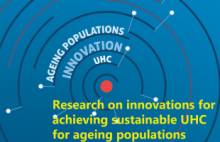
WKC: Research on innovations for achieving sustainable universal health coverage for ageing populations
On 10 September 2016, the WHO Kobe Centre, along with Ministry of Health, Labour and Welfare, is organizing an official side event to the G7 Health Ministers meeting that will discuss “UHC, Innovation and Ageing: Research on innovations for achieving sustainable universal health coverage for ageing populations”.
On 11 and 12 September 2016, the G7 Health Ministers' Meeting will be held in Kobe City, where the G7 countries, the European Commission, and key international organizations (including WHO, World Bank, and OECD) will discuss urgent global health issues. One of the key topics will be how to attain universal health coverage (UHC) and to strengthen health systems for ageing populations.
The Event will highlight the new WHO Kobe Centre ten-year research strategy, ongoing and planned research, and information dissemination focusing on UHC and ageing populations. Experts from around the world will share their experiences and lessons followed by discussion amongst all participants.
Examples of issues to be discussed include: policy and programme innovations; new community-based models of care and support, integrated and coordinated health and long term care systems; technological innovations; and monitoring of age and dementia friendly initiatives. Lessons from Japan for ageing societies, new issues such as increasing prevalence of cognitive impairments/dementia, and efforts to increase research capacity strengthening will be discussed.
A keynote presentation entitled “Asia Human Well-being Initiative” by Professor Keizo Takemi, Member, House of Councillors of Japan, and a special G7 panel session on dementia coordinated by Ministry of Health, Labour and Welfare, are part of the programme.
A Special Event to celebrate the third decade of WKC and support from the Kobe Group (Hyogo Prefecture, Kobe City, Kobe Steel, Ltd, and Kobe Chamber of Commerce and Industry) is part of the programme. It will highlight the WHO Director-General, Dr Margaret Chan, Governor Ido, Mayor Hisamoto, Mr Kawasaki (Kobe Steel). In addition, the Hyogo-Kobe High Schools will hand over to the WHO Director General their declaration on global health from the 21 August 2016 Forum in Kobe.
G7 Kobe Health Ministers’ Meeting Official Side Event
UHC, Innovation and Ageing: Research on innovations for achieving sustainable universal health coverage for ageing populations
Time:10 September, 2016 9:00-16:30(opens 8:30)
Venue:Hyogo House
(〒650-8567 4-4-1 Shimoyamatedori, Chuo-ku, Kobe TEL 078-341-7711)
Number of Participants:150(invitation only)
Language:English–Japanese simultaneous interpretation available
Organized by: WHO Kobe Centre and Ministry of Health, Labour and Welfare
Provisional Programme
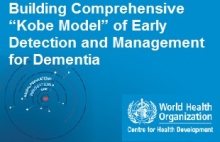
New WHO-Kobe University Research Collaboration:
The WHO Kobe Centre and Kobe University announced today that they have entered into agreement to conduct research on developing a frugal comprehensive model of early detection and management for dementia.
Worldwide, there has been a significant increase in numbers of people with some form of dementia. In 2012, the number of people with cognitive problems in Japan was more than 8 million, including more than 4.5 million persons with dementia and more than 4 million people with mild cognitive impairment (MCI). And, this figure will increase rapidly as Japan’s percentage of its population over 65 years rises.
Scientific evidence indicates that earlier identification of dementia can lead to interventions that can slow the process of cognitive decline, and thus potentially delay the transition to severe dementia.
The WHO Kobe Centre is supporting Kobe University and key partners to conduct a three year project, with support by Kobe City, to develop and test a comprehensive model of mass screening and targeted community education leading to effective and efficient early detection and diagnosis of dementia.
“The outcome of the research is expected to contribute to ultimately reduce social burden of dementia on persons living with dementia and their family members, and to provide evidence for improving community and government future policy for dementia management, and how to structure community-based awareness and care programmes in Japan and worldwide" said Mr Alex Ross, Director, WHO Kobe Centre.
“Kobe has been a pioneer in conducting dementia and ageing-related research. The results of this research project will hopefully contribute to delay further deterioration, where there is no cure for dementia and to build community where people with dementia can continue to stay independent” said Professor Yoji Nagai, lead researcher and Director, Center for Clinical Research, Kobe University Hospital.
Note to editors:
- Research Group members include:
Kobe University (lead research institution):
o Professor Yoji Nagai, lead researcher and Director, Center for Clinical Research, Kobe University Hospital
Translational Research Informatics Center:
o Dr. Shinsuke Kojima, Foundation for Biomedical Research and Innovation
Kobe Gakuin University:
o Professor Kiyoshi Maeda, School of Rehabilitation
WHO Kobe Centre:
o Dr Ryoma Kayano, Technical Officer
- Dementia is a syndrome in which there is deterioration in memory, thinking, behaviour and the ability to perform everyday activities
- Although dementia mainly affects older people, it is not a normal part of ageing.
- Alzheimer's disease is the most common cause of dementia and may contribute to 60–70% of cases.
- More than 47 million people are living with dementia there are 7.7 million new cases every year. Sixty percent of these people live in low- and middle-income countries. Driven by population ageing, this number is expected to triple by 2050. Already, dementia and cognitive impairment are the leading chronic disease contributors to disability and dependence among older people worldwide.
- Dementia is one of the major causes of disability and dependency among older people worldwide.
- Dementia has physical, psychological, social and economical impact on caregivers, families and society.
- In 2010, the worldwide cost of dementia, mainly driven by social-care needs, was estimated at US$ 604 billion. Without breakthroughs in effective treatment and care, these costs are set to soar, with costs growing fastest in low- and middle-income countries.


